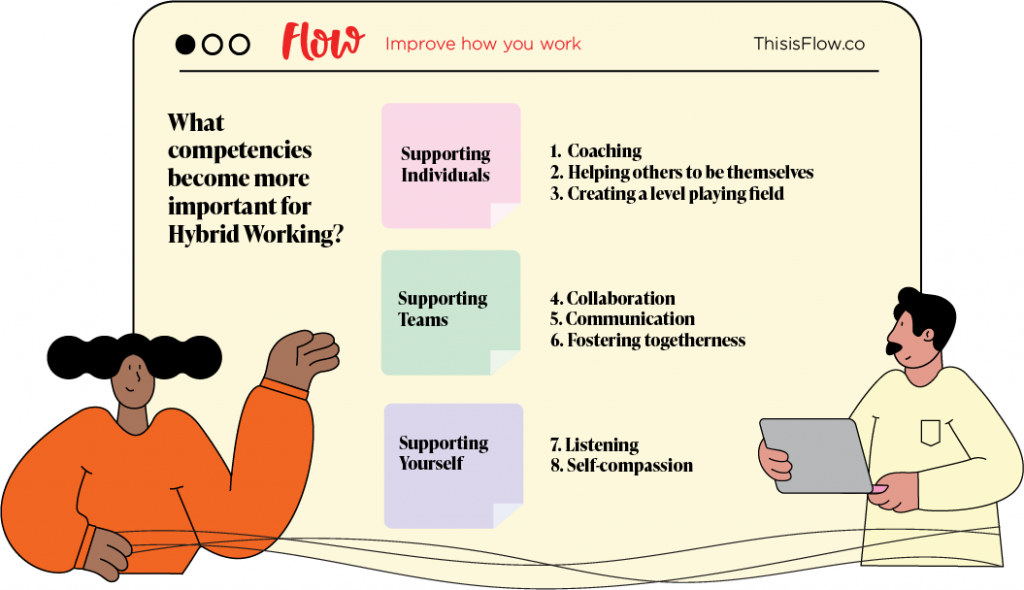What competencies become more important for hybrid working?

If you work in a global company, you already know that working across geographies and time zones brings a learning curve of working well together. But at least you had a home base of a team you sat next to every day; before the Pandemic, the most common experience was spending most of the week in an office with your team. That brings with it benefits that we had taken for granted. We learn most through social learning, observing and copying others and having immediate access to colleagues to work through problems and get the work done.
Now it’s the same but different. Those skills and behaviours that we infrequently needed to work with remote colleagues are now the skills we depend on to do any work. We used to understand our colleagues’ work preferences because we spent so much time with them. We may have viewed work and home life as more discrete parts of our life. Today they feel more interwoven.
How can we best equip ourselves to appreciate that difference and support individuals, our teams and ourselves in embracing the potential for Hybrid Working?
Supporting individuals in Hybrid
Three competencies have become more critical than they were just a few years ago. Coaching, helping others to be themselves and creating a level playing field.
1. Coaching
Happiness before the Pandemic was due to employees’ sense of belonging within the company and amongst colleagues, flexibility, inclusivity, and a sense of purpose to their work (in descending order of importance). During the Pandemic, having a supportive manager became the most significant predictor of happiness, according to The World Happiness Report 2021
At work, our sense of commitment and control depends most on our direct boss than on anyone else. A supportive boss strengthens our relationship with the company, and we feel we have more agency.
Coaching has been in reverse for many decades. Middle managers are often interested in coaching but need more training in it, and the increased demands of their jobs steal their time and energy to do so. But in the hybrid environment, when individuals have less exposure to social learning, coaching becomes a priority competency. Nested within this competency is coaching individuals on the attributes that were important to nurture even before hybrid:
- Using your strengths
- Fostering initiative-taking and self-direction
- Moving between independent and collaborative work
- Providing frequent, timely and specific feedback to accelerate development
- Adaptability – the ability to quickly and calmly adjust (strategies, tactics, expectations) to changing circumstances and situations
2. Helping others to be themselves
Employees have always worried about whether they have a purpose in the organisation, whether they feel genuinely included vs. isolated and whether they and their work matters (significance). We are now seeing colleagues bring much more of their emotional selves to work conversations. Employees should be encouraged to bring their whole-self to work, and we must continue to find ways to allow people to stand out rather than fit in.
This requires people leaders to work on their empathy. Work demands often mean we become focused on ourselves when we need to be more sensitive to what is going on for the people we are trying to achieve things with. It’s therefore becoming more important to take time to listen to colleagues as individuals and understand their needs, priorities and motivations.
Psychological Safety was found to be the most essential quality of successful teams at Google. A psychologically safe team is one where team members feel comfortable enough to share ideas, admit mistakes, and be themselves. When you don’t sit with your team every day, being yourself can feel much more daunting. In hybrid work, demonstrating vulnerability, leaning into emotions and thanking people for their honesty are all important behaviours.
3. Creating a level playing field
Hybrid working increases the risk of proximity bias, favouring those people who are physically present, who are always contactable and who respond quickly. When we are physically separated, we risk falling into patterns of only connecting with and giving opportunities to the ‘usual’ people we spend the most time with, and we feel we know better. To counteract this, it’s important that employees are evaluated on outcomes. If certain team members are ‘out of sight, out of mind’, what does that mean for both your mindset, the assumptions you carry and how you foster togetherness?
Supporting Teams in Hybrid
We now need greater emphasis on four competencies to support teams in our Hybrid Environments; collaboration, communication, fostering togetherness and creating a level playing field.
4. Collaboration
Again, this is familiar but the emphasis has shifted. That’s due to two reasons. Firstly, home working during the Pandemic shrunk people’s networks, with people tending to spend time with their closest relationships. Secondly, collaborating and building networks when remote brings new challenges. Many companies are in a phase where they have yet to be overly deliberate in defining how teams should collaborate in a hybrid environment.
Collaboration is suitable for certain tasks and less ideal for others. The danger is that people try to collaborate on everything and fall into the trap of endless unproductive meetings.
An important distinction is the difference between collaboration and cooperation. Contribution becomes exponential rather than additive when people move from a collaborative to a cooperative mindset and set of behaviours. Cooperation broadens the perspective from the minimum we need to volunteer to the maximum we feel we can contribute. It borrows heavily from the concept of reciprocity.
- Collaboration – we need to work together to meet our goals
- Cooperation – I want to share voluntarily to help others
5. Communication
Human communication usually fails except by accident. In short, you need to communicate more than you think you need to. The useful concepts here are confusion and clarity. Employees tend to operate with much greater confusion than you think. Greater clarity is the antidote, and the transparency trend is here to stay. Amanda Atkins, Head of Internal Communications at Slack, has written some great advice on what excellent internal communications looks like.
6. Fostering togetherness
Spend any time at all looking at targets and remuneration measures, and you’ll see that organisations tend to focus too much on the individual rather than on groups. Thanks to our biology, we freeze within teams and develop us vs them attitudes. This has different consequences when we have team members who are not physically located. What unites and connects rather than separates us needs to be reaffirmed regularly. That’s why defining your team’s values is so helpful. Team values help determine how we work together to be at our best and how we stand together. As Amy Edmerson states, a critical aspect of leadership is to “manage meaning.” Humans crave meaning, and people leaders help shape meaning, helping us make sense of our role and identity within the company.
Supporting Yourself in Hybrid
The final two competencies focus on supporting yourself through this transitional phase of your working life.
7. Listening
Listening is arguably the greatest competency that we possess that few people master in their lifetimes. We are programmed to make noise. We believe that effective communication revolves around speaking and influencing. Oscar Trimboli underlines this by saying that we have no difficulty in naming famous speakers such as Winston Churchill, John Kennedy, Eleanor Roosevelt, Martin Luther King, Rosa Parks and others. But what if you were asked to name a famous listener? Listening is the most underrated and unappreciated skill in business.
Listening is the cornerstone of empathy, and it unlocks insight, it helps people feel included. It has never been more critical than it is in this working environment. In each conversation, you only have to focus on being better than you were in your last one.
8. Self-compassion
We’re living in a period of work that doesn’t feel normal (yet), and we’re dealing with our own emotions of how we lead ourselves and others through this moment of change. As we dig deep within ourselves to find the personal resources to navigate this moment, we must exercise self-compassion and not give in to any temptation to beat ourselves up. Learn what supports you to cope and take great pride in the fact that in the world of hybrid, you are stepping into the metaphorical arena every day to test and learn what works.
In summary
As a suggestion, why not use this list of competencies to start a discussion on how you are moving forwards with your hybrid work experiments. As always, it’s small adjustments that can have the most significant impact.

Flow is a ways of working company. We help you to create the conditions where your people can flourish, where decisions, meetings and ideas can flow. If you’d like to discuss how we can help you to improve your ways of working in hybrid, get in touch at hi@thisisflow.co






